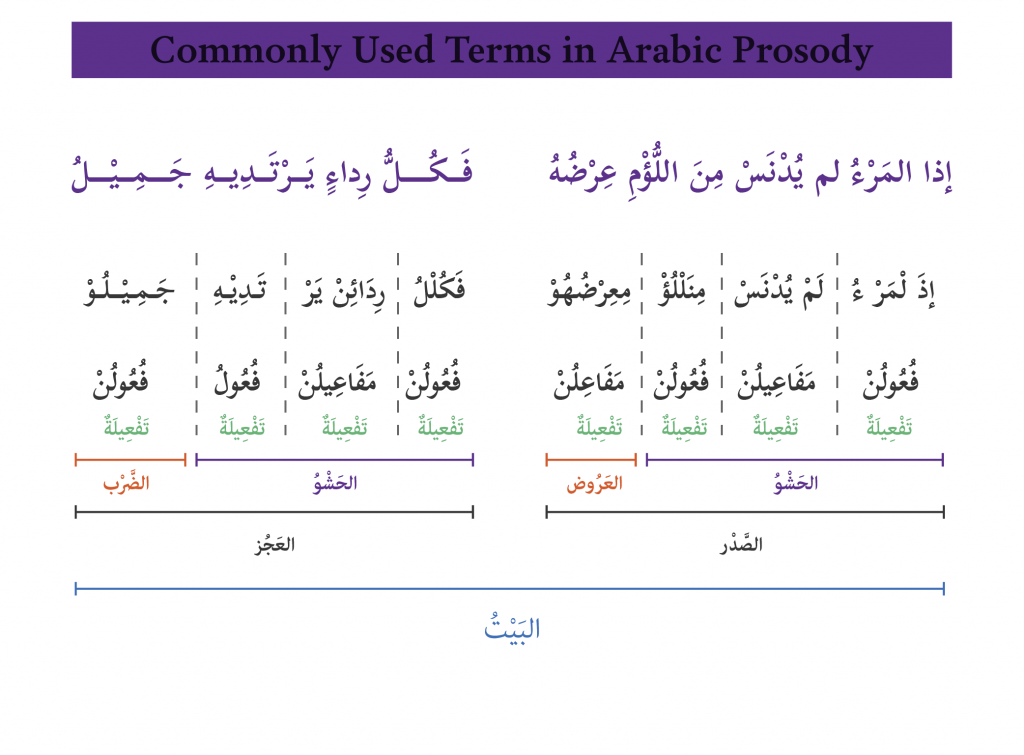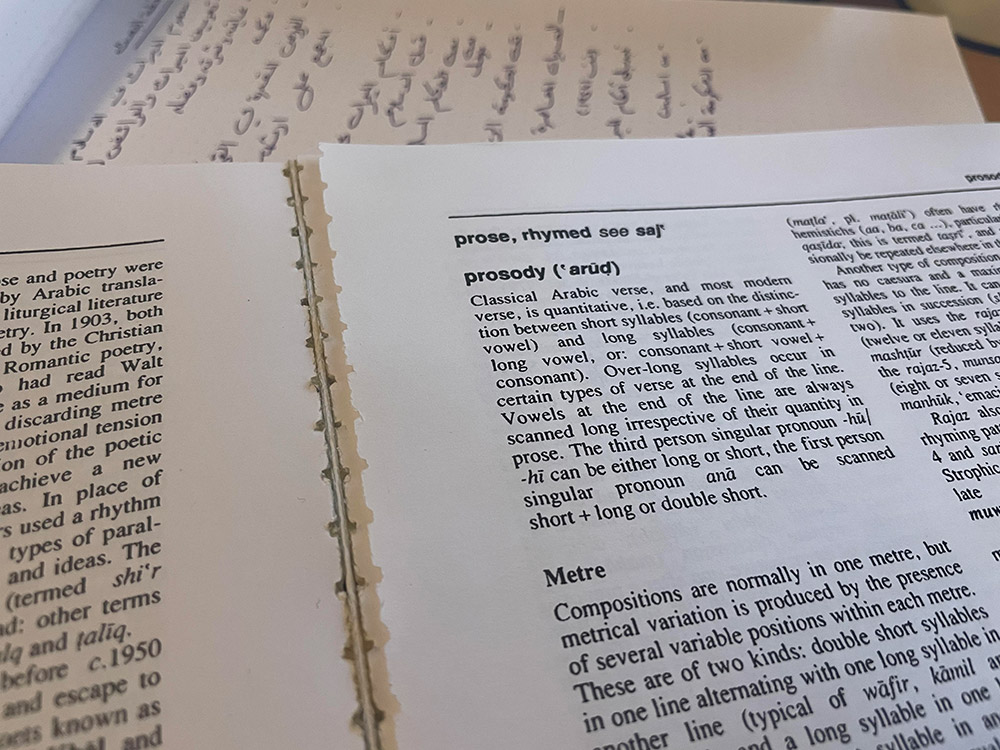Introduction
Al-‘Arūd (Prosody) is the study of Arabic poetic meter, which helps to determine if the poetry is sound or broken. Al-Khalīl ibn Aḥmad al-Farāhīdī (d. 786) was the first to discover that all classical poetry followed one of 15 meters. Later Al-Akhfash al-Akbar identified a 16th meter.
Although very stringent in its requirements, almost all the well-known classical Arabic poetry conforms to one of these meters.
It is worth mentioning here that even though these meters were written down and theorized by Al-Khalīl at a later date, the classical Arab poets used them instinctively. Anything that ‘broke’ one of these meters was naturally identified as being of sub-par quality. It is remarkable that they were able to stay within these patterns or meters when composing poetry without referring to them in the form of written rules.
Terminology

Before getting started, let’s get familiar with some commonly used terms in Arabic prosody.
A single line of poetry consisting of two hemistichs or half lines, is called a bayt.
Each individual foot is known as a taf’īlāh.
The first hemistich is called ṣadr. The second hemistich is called ‘ajuz.
The last foot of the ṣadr is called the ‘arūd. The last foot of the ‘ajuz is called ḍarb.
The remaining parts of each hemistich is known as ḥashw.
How to Scan Arabic Poetry
Scanning Arabic poetry according to the traditional method involves the following steps: transcription, symbolization, and superimposing the taf’īlāt (feet) to identify the correct meter. We will explain each step in detail.
1. Transcribing Arabic Poetry
In order to scan Arabic poetry accurately, it is first transcribed directly from its oral form. Or in other words, it is written according to how it is pronounced.
We will first look at the rules for how this is done and then go through several examples.
The golden rule: What is pronounced is written, and what is not pronounced is omitted.
And from this principle, the following rules can be derived:
- Maddah: The maddah is written as a ḥamza followed by an alif
آمَنَ ← أَاْمَنَ
- Tanwīn: The tanwīn is written with the nūn sākin
قَلَمٌ ← قَلَمُنْ، صَبَاحاً ← صَباحَنْ، لَيْلَةٍ ← لَيْلَتِنْ
- Shaddah: The letters with shaddah are written as double, with sukūn on the first and the ḥarakah on the second.
ثُمَّ ← ثُمْمَ، كَأَنَّ ← كَأَنْنَ، أُحِبُّ ← أُحِبْبُ
- Hidden alif: The alif that is not written but pronounced is always transcribed.
هذَا ← هَاذَا. هذِهِ ← هَاذِهِ. هذَانِ ← هَاذَانِ. هؤُلاَءِ ← هَاؤُلاَءِ. ذلِكَ ← ذَالِكَ. اللهُ ← الْلاَهُ. لكِن ← لَاكِنْ. لكِنَّ ← لَاكِنْنَ. الرَّحْمنُ ← ارْرَحْمَان
- Hidden wāw: The wāw which is not written but pronounced is always transcribed.
دَاودُ ← دَاوُوْدُ. طَاوسُ ← طَاوُوسُ. نَاوُسُ ← نَاوُوْس
- Ḥarf al-qāfiyah: The ḥarf of the qāfiyah, or the final vowel at the end of each half-line is converted into a long vowel.
يَكْتُبُ ← يَكْتُبُوْا. مُدَلَّلِ ← مُدَلْلَلِيْ. تَعَلَّمَ ← تَعَلْلَمَا
- Hā ͑ al ḍamīr al-mufrad al-ghā ͑ ib: The third person singular pronoun (hu/hi) can be written as either long or short.
لَهُ ← لَهُ ⁄ لَهُو. مِنْهُ ← مِنْهُ ⁄ مِنْهُو. بِهِ ← بِهِ ⁄ بِهِي. إِلَيْهِ ← إِلَيْهِي
- Ḥamzat al-waṣl: It is omitted where it is not pronounced.
فَاكْتُبْ ← فَكْتُبْ. فَاسْتَغْفِرْ ← فَسْتَغْفِرْ. فَاذْهَبْ ← فَذْهَبْ
As for the (أل) if the letter after it is qamariyyah, only the alif is removed. If it is shamsiyyah, both the alif and lām are removed.
دَخَلْتُ البَيْتَ ← دَخَلْتُ لْبَيْتَ
فُتِحَتِ التّابُوتُ ← فُتِحَتِ تْتَابُوْتُ
- Alif, wāw and yā ‘ al-sākinah: The alif, wāw and yā ‘ al-sākinah will be omitted when succeeded by a sākin.
فِيْ البَحْرِ ← فِلْبَحْرِ
إِلَى العُلَا ← إلَلْعُلَا
قَاضِيْ القُضَاةِ ← قَاضِلْقُضَاةِ
حَتَّى العَصْرِ ← حَتْتَلْعَصْرِ
- Additional wāw: The additional wāw in certain nouns which is not pronounced, is omitted.
عَمْرُو ← عَمْرُ
- Alif al-fāriqah: the additional alif at the ends of verbs in plural form are omitted
جَلَسُوْا ← جَلَسُو. كَتَبُوا ← كَتَبُوْ
- Ana: Ana the first person singular pronoun is usually written with a short vowel
أَنَا ← أَنَ
Examples:
البحر الطويل، وهو من قصيدة للسَّموأل:
إذا المَرْءُ لم يَدْنَسْ مِنَ اللُّؤُمِ عِرْضُهُ فَــكُــــلُّ رِداءٍ يَــرْتَــدِيــهِ جَـــمِــيْـــلُ
إذَ لْمَرْ ءُ لَمْ يَدْنَسْ مِنَلْلُؤْ مِعِرْضُهُوْ فَكُلْلُ رِدَائِنْ يَرْ تَدِيْهِ جَمِيْلُوْ
من الكامل، من قول عنترة:
وإذا صَـحَـوْتُ، فَـما أُقَصِّــرُ عَنْ نَــدًى وَكَمـــا عَلِمْتِ شَـــــمَائِـلي وَتَــكَرُّمِي
وَإِذَاْ صَحَوْ تُ فَمَاْ أُقَصْـ صِرُ عَنْ نَدَنْ وَكَمَا عَلِمْـ تِ شَمَاْئِلِيْ وَتَكَرْرُمِيْ
من البحر الوافر، قول عمرو بن معد يكرب:
إذا لَــمْ تَـسْــتَــطِعْ شَــيْئــاً فَــدَعْـــهُ وَجَــــاوِزْهُ إلــــى مـــا تَــســـتَـــطيــــعُ
إِذَاْ لَمْ تَسْـ تَطِعْ شَيْئَنْ فَدَعْهُو وَجَاْوِزْهُو إِلَىْ مَاتَسْـ تَطِيْعُو
2.Symbolization
After transcription as shown, the next step is to symbolize each mutaḥarrik (fatḥah, ḍammah or kasrah) with (/) and each sākin with (0). This breaks down the poetry to the essential sounds – the ḥarakah and the sukūn.
أبــا مُنْـــذِرٍ أَفْنَيْتَ فَـــاسْتَبْقِ بَــعْـضَنَــا حَـنَانَيْكَ بَـعْـضُ الشَّـــرِّ أَهْـوَنُ مِنْ بَــعْضِ
أَبَاْ مُنْـ ذِرِنْ أَفْنَيْـ تَ فَسْتَبْـ قِ بَعضَنَاْ حَنَاْ نَيـْ ـكَ بَعْضُشْ شَرْرِ أهْوَ نُ مِنْ بَعْضِيْ
//0/0 //0/0/0 //0/0 //0//0 //0/0 //0/0/0 //0/ //0//0
إذا المَرْءُ لم يَدْنَسْ مِنَ اللُّؤُمِ عِرْضُهُ فَــكُــــلُّ رِداءٍ يَــرْتَــدِيــهِ جَـــمِــيْـــلُ
إِذَ لْمَرْ ءُ لَمْ يَدْنَسْ مِنَلْلُؤْ مِعِرْضُهُوْ فَكُلْلُ رِدَائِنْ يَرْ تَدِيْهِ جَمِيْلُوْ
//0/0 //0/0/0 //0/0 //0//0 //0/ //0/0/0 //0/ //0/0
3.Superimposing the Taf’īlāt
The final step when scanning Arabic poetry is to identify the correct taf’īlāt and superimpose them to the lines. The arrangement of these taf’īlāt will show us the meter of the poem.
The taf’īlah (foot) is a basic building block of the poetry and its basic sounds (ḥarakah and sukūn) correspond to that of the poetry when superimposed.
There are a total of 10 taf’īlāt used to represent the buhūr or the meters.
فَعُولُنْ (//0/0)
مَفَاعِيْلُنْ (//0/0/0)
مُفَاعَلَتُنْ (//0///0)
فاعِ لاتُنْ (/0/ /0/0)
فَاعِلُنْ (/0//0)
مُسْتَفْعِلُنْ (/0/0//0)
فَاعِلَاتُنْ (/0//0/0)
مُتَفَاعِلُنْ (///0//0)
مَفْعُوْلاتُ (/0/0/0/)
مُسْتَفْعِ لُنْ (/0/0/ /0)
Let’s revisit the previous example:
أبــا مُنْـــذِرٍ أَفْنَيْتَ فَـــاْسْتَبْقِ بَــعْـضَنَــا حَـنَانَيْكَ بَـعْـضُ الشَّـــرِّ أَهْـوَنُ مِنْ بَــعْضِ
أَبَاْ مُنْـ ذِرِنْ أَفْنَيْـ تَ فَسْتَبْـ قِ بَعضَنَاْ حَنَاْ نَيـْ ـكَ بَعْضُشْ شَرْرِ أهْوَ نُ مِنْ بَعْضِيْ
//0/0 //0/0/0 //0/0 //0//0 //0/0 //0/0/0 //0/ //0//0
The meter for this is as follows:
فَعُولُنْ مَفَاعِيلُنْ فَعُولُنْ مَفَاعِلُنْ فَعُولُنْ مَفَاعِيلُنْ فَعُولُ مَفَاعِلُنْ
and this is a variant of the ṭawīl meter.
Arabic Poetic Meters
There are a total of 16 buhūr (seas) or meters for Arabic poetry. These lines provide a key to these meters. It is highly recommended that you memorise them.
Key to the Meters:
طَـوِيلٌ لَـهُ دُونَ الْبُـحُورِ فَضَـائِلُ***فَعُولُنْ مَفَاعِيلُنْ فَعُولُنْ مَفَاعِلُ
لِـمَــدِيــدِ الـشِّـعْرِ عِـنْـدِي صِــفَــاتُ***فَـاعِـلَاتُـنْ فَاعِلُنْ فَاعِلَاتُ
إِنَّ الْبَسِــيـطَ لَـدَيهِ يُبْسَـطُ الْأَمَـلُ***مُسْتَفْعِلُنْ فَاعِلُنْ مُسْتَفْعِلُنْ فَعِلُ
بُــحُــورُ الشِّــعْرِ وَافِــرُهَـا جَـمِيــلُ***مُـفَاعَـلَتُنْ مُـفَـاعَلَتُنْ فَعُولُ
كَـمُـلَ الْـجَمَــالُ مِـنَ الْبُحُورِ الْكَامِلُ***مُتَفَاعِلُنْ مُتَفَاعِلُنْ مُتَفَاعِلُ
عَــلَــى الأَهْـــــزَاجِ تَـسْــهِــيـــلُ***مَـــفَــاعِـيــلُــنْ مَـــفَــاعِــيلُ
فِـي أَبْحُـرِ الْأَرْجَــازِ بَـحْـرٌ يَسْهُلُ***مُسْتَفْعِلُنْ مُسْتَفْعِلُنْ مُـسْتَفْعِلُ
رَمَــلُ الْأَبْــحُــرِ تَـرْوِيــهِ الـثِّـقَاتُ***فَاعِـلَاتُنْ فَاعِـلَاتُنْ فَاعِـلَاتُ
بَـحْـرٌ سَــرِيــعٌ مَـا لَـهُ سَـاحِــلُ***مُــسْـتَـفْـعِـلُـنْ مُسْتَفْعِلُـنْ فَاعِـلُ
مُــنْـسَـرِحٌ فِــيـهِ يُـضْــرَبُ الْمَثَلُ***مُـسْتَفْعِلُنْ مَـفْـعُولَاتُ مُـفْتَعِلُ
يَـا خَـفِـيـفًـا خَـفَّـتْ بِـهِ الْحَرَكَاتُ***فَـاعِـلَاتُنْ مُـسْتَفْعِلُنْ فَـاعِلَاتُ
تُـــــعَــــدُّ الْـمُـــضَــارِعَـــاتُ***مَـــــفَـــــاعِـــــيـــلُ فَــــاعِ لَاتُ
اِقْــــتَـــضِـــبْ كَــــمَـــا سَـــأَلُـــوا***مَــــفْـــعُولاتُ مُــــفْــــتَعِلُ
جُـــثَّـــتِ الْحَــــرَكَـــــــــاتُ***مُــــسْــــتَـــفْــــعِــــلُنْ فَــــاعِلَاتُ
عَــنِ الْمُـــتَــقارِبِ قَالَ الْخَلِيلُ***فَـعُولُـنْ فَـعُولُـنْ فَـعُولُـنْ فَـعُولُ
حَـــرَكَـــاتُ المُــــحْــدَثِ تَـنْـتَـقِــلُ***فَـعِلُـنْ فَـعِلُـنْ فَـعِلُـنْ فَـعِــلُ
Now we will take a look at the first meter – ṭawīl. This is a common meter and a lot of classical Arabic poetry including Imru ‘ al Qays’ famous mu’allaqah uses this meter
Ṭawīl Meter
فُعُولُنْ مَفَاعِيلُنْ فُعُولُنْ مَفَاعِلُينْ فُعُولُنْ مَفَاعِيلُنْ فُعُولُنْ مَفَاعِيلُنْ
Key:
طَوِيلٌ لَهُ دُونَ البُحُورِ فَضَائِلُ فُعُولُنْ مَفَاعِيلُنْ فُعُولُنْ مَفَاعِيلُنْ
Variations:
The ṭawīl meter can has one ‘arūd – مَفَاعِلُنْ. As for the dharb, it can have three variants:
- مَفَاعِيلُنْ
- مَفَاعِلُنْ
- فُعُولُنْ
So the meters are:
فُعُولُنْ مَفَاعِيلُنْ فُعُولُنْ مَفَاعِلُنْ فُعُولُنْ مَفَاعِيلُنْ فُعُولُنْ مَفَاعِيلُنْ
فُعُولُنْ مَفَاعِيلُنْ فُعُولُنْ مَفَاعِلُنْ فُعُولُنْ مَفَاعِيلُنْ فُعُولُنْ مَفَاعِلُنْ
فُعُولُنْ مَفَاعِيلُنْ فُعُولُنْ مَفَاعِلُنْ فُعُولُنْ مَفَاعِيلُنْ فُعُولُ فَعُولُنْ
Minor Deviations
The ṭawīl meter allows some minor deviations in the feet as well. These are known as ziḥāf. Here are the common ones:
- Kaff
مَفَاعِيلُنْ ← مَفَاعِيلُ
The final nūn can be subtracted from mafā’ilun to make it mafā’ilu. This is known as kaff.
2. Qabḍ
فُعُولُنْ ← فُعُولُ
The final nūn can be subtracted from fu’ūlun to make it fu’ūlu.
These are non-persistent. This means that these can be present in one line and absent in the rest.
Kaff and Qabḍ don’t usually occur together in the same line usually.
Examples
أَبَا مُنْذِرٍ أَفْنَيْتَ فَاسْتَبْقِ بَعْضَنَا حَنَانَيْكَ بَعْضُ الشَّرِّ أَهْوَنُ مِنْ بَعْضِ
أَبَا مُنْ ذِرِنْ أَفْنَيْ تَ فَسْتَبْ قِبَعْضَنا حَنَانَيْ كَ بَعْضُشْشَرْ رِأَهـْوَ نُ مِنْ بَعْضِي
فُعُولُنْ مَفَاعِيلُنْ فُعُولُنْ مَفَاعِلُنْ فُعُولُ مَفَاعِيلُنْ فُعُولُ مَفَاعِيلُنْ
Translation:
Father of Mundhir, leave some of us, for you have annihilated (us)
Show us much tenderness; some evils are lighter than others
وليلٍ كمَوجِ البحر أرخى سدولَـه علــيّ بـأنواع الهـمـــوم لـيبـتـلي
وَلَيْلِنْ كَمَوْجِلْ بَحْ رِأَرْخَىْ سُدُولَهُو عَلَيْيَ بِأَنْوَاعِلْ هُمُومِ لِيَبْتَلِي
فُعُولُنْ مَفَاعِيلُنْ فُعُولُنْ مَفَاعِلُنْ فُعُولُ مَفَاعِيلُنْ فُعُولُ مَفَاعِلُنْ
Translation
A night like the waves of the ocean which has let down its curtains
Around me, with a multitude of sorrows, to test me
فــقلـت لــه لــمّا تمطّى بصُــلبـه وأردف أعــجـازًا ونـاء بـكـلـكلِ
فَقُلْتُ لَهُولَمْمَا تَمَطْطَى بِ صُلْبِهِي وَأَرْدَ فَ أَعْجَازَنْ وَنَاءَ بِكَلْكَلِي
فُعُولُ مَفَاعِيلُنْ فُعُولُ مَفَاعِلُنْ فُعُولُ مَفَاعِيلُنْ فُعُولُ مَفَاعِلُنْ
Translation
Then I said to it, as it extended its body
And it mounted its back, and its chest weighed down
ألا أيها الليل الطـويلُ ألا انـجلي بصبح وما الإصباحُ مـنك بأـمثلِ
أَلَاأَيْ يُهَلْ لَيْلُطْ طَوِيلُ أَلَنْجَلي بِصُبْحِنْ وَمَلْ إِصْبَا حُ مِنْكِ بِأمْثَلِي
فُعُولُنْ مَفَاعِيلُنْ فُعُولُ مَفَاعِلُنْ فُعُولُنْ مَفَاعِيلُنْ فُعُولُ مَفَاعِلُنْ
O’ long night do you not recede,
So that the morn may rise; but the morn is no better than you.
إِذَا المَرْءُ لَمْ يَدْنَسْ مِنَ اللُّؤْمِ عِرْضُهُ فَكُلُّ رِدَاءٍ يَرْتَدِيهِ جَمِيلُ
إِذَلْ مَرْ ءُ لَمْ يَدْنَسْ مِنَلْلُؤْ مِعِرْضُهُو فَكُلْلُ رِدَاءِنْ يَرْ تَدِيهِ جَمِيلُو
فُعُولُنْ مَفَاعِيلُنْ فُعُولُ مَفَاعِلُنْ فُعُولُنْ مَفَاعِيلُنْ فُعُولُ فُعُولُنْ
If a man doesn’t soil his honour with indignity
Then every garment he wears is beautiful
Practice
Finally, here is some poetry which uses the ṭawīl meter:
قِفَا نَبْكِ مِنْ ذِكْرَى حَبِيبٍ ومَنْزِلِ بِسِقْطِ اللِّوَى بَيْنَ الدَّخُول فَحَوْمَلِ
فَتُوْضِحَ فَالمِقْراةِ لمْ يَعْفُ رَسْمُها لِمَا نَسَجَتْهَا مِنْ جَنُوبٍ وشَمْألِ
تَرَى بَعَرَ الأرْآمِ فِي عَرَصَاتِهَا وَقِيْعَانِهَا كَأنَّهُ حَبُّ فُلْفُلِ
كَأنِّي غَدَاةَ البَيْنِ يَوْمَ تَحَمَّلُوا لَدَى سَمُرَاتِ الحَيِّ نَاقِفُ حَنْظَلِ
وُقُوْفًا بِهَا صَحْبِي عَليَّ مَطِيَّهُمُ يَقُوْلُوْنَ: لا تَهْلِكْ أَسًى وَتَجَمَّلِ
وإِنَّ شِفائِيَ عَبْرَةٌ مُهْرَاقَةٌ فَهَلْ عِنْدَ رَسْمٍ دَارِسٍ مِنْ مُعَوَّلِ؟
كَدَأْبِكَ مِنْ أُمِّ الحُوَيْرِثِ قَبْلَهَا وَجَارَتِهَا أُمِّ الرَّبَابِ بِمَأْسَلِ
إِذَا قَامَتَا تَضَوَّعَ المِسْكُ مِنْهُمَا نَسِيْمَ الصَّبَا جَاءَتْ بِرَيَّا القَرَنْفُلِ
فَفَاضَتْ دُمُوْعُ العَيْنِ مِنِّي صَبَابَةً عَلَى النَّحْرِ حَتَّى بَلَّ دَمْعِيَ مِحْمَلِي
ألَا رُبَّ يَوْمٍ لَكَ مِنْهُنَّ صَالِحٍ وَلَا سِيَّمَا يَوْمٌ بِدَارَةِ جُلْجُلِ
أَمِنْ أمِّ أَوفَى دِمْنَةٌ لَمْ تَكَلَّمِ بِحَوْمَانَةِ الدَّرَّاجِ فَالمُتَسَلَّمِ
أَقِيمُوا بَنِي أُمِّي صُدُورَ مَطِيٍّكُمْ فَإِنِّي إِلَى قَوْمٍ سِوَاكُمْ لَأَمْيَلُ
فَقَد حُمَّت الحاجاتُ واللَيلُ مُقمِرٌ وَشُدَّت لِطِيّاتٍ مَطايا وَأَرُحلُ
لَعَمْـرُكَ مَا بِالأَرْضِ ضِيـقٌ على امْرِىءٍ سَرَى رَاغِبَـاً أَوْ رَاهِبَـاً وَهْوَ يَعْقِـلُ
وَلِي دُونَكُمْ أَهْلُـون: سِيـدٌ عَمَلَّـسٌ وَأَرْقَطُ زُهْلُـولٌ وَعَرْفَـاءُ جَيْـأََلُ
وَفي الأَرضِ مَنأى لِلكَريمِ عَنِ الأَذى وَفيها لِمَن خافَ القِلى مُتَعَزَّلُ
وَإنْ مُـدَّتِ الأيْدِي إلى الزَّادِ لَمْ أكُـنْ بَأَعْجَلِهِـمْ إذْ أَجْشَعُ القَوْمِ أَعْجَلُ
عَلَى قَدْرِ أَهْلِ العَزمِ تَأْتِي العَزَائِمُ وَتَأْتِي عَلَى قَدْرِ الكِرَامِ المَكَارِمُ
وَتَعْظُمُ فِي عَيْنِ الصَّغِيرِ صِغَارُهَا وَتَصْغُرُ فِي عَيْنِ العَظِيمِ العَظَائِمُ
لِخَوْلَةَ أَطْلَالٌ بِِبُرقَةِ ثَهْمَدِ تَلُوحُ كَبَاقِي الوَشْمِ فِي ظَاهِر اليَدِ
وُقُوفًا بِهَا صَحْبِي عَلَيَّ مَطيَّهُمْ يَقُولُونَ لَا تَهلِكْ أَسىً وَتَجَلَّدِ
سَتُبْدِي لَكَ الأَيَّامُ مَا كُنْتَ جَاهِلاً وَيَأْتِيكَ بِالأَخْبَارِ مَنْ لَمْ تُزَوِّدِ
عَنِ المَرْءِ لَا تَسْأَلْ، وَأَبْصِرْ قَرِينَهُ فَإنَّ القَرِينَ بِالمُقَارِنِ يَقْتَدِي
أرَاكَ عَصِيَّ الدّمعِ شِيمَتُكَ الصّبرُ أما للهوى نهيٌّ عليكَ ولا أمرُ ؟
بلى أنا مشتاقٌ وعنديَ لوعة ولكنَّ مثلي لا يذاعُ لهُ سرُّ
إذا الليلُ أضواني بسطتُ يدَ الهوى وأذللتُ دمعاً منْ خلائقهُ الكبرُ
تَكادُ تُضِيءُ النّارُ بينَ جَوَانِحِي إذا هيَ أذْكَتْهَا الصّبَابَة ُ والفِكْرُ
معللتي بالوصلِ ، والموتُ دونهُ إذا مِتّ ظَمْآناً فَلا نَزَل القَطْرُ



